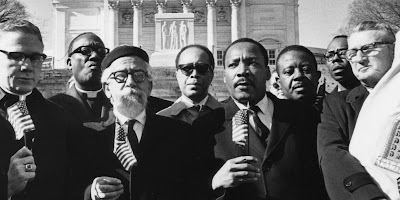Zum Nachdenken: Heschel über Religion und Rassismus

In Zeiten, in denen es (nicht nur) in Amerika drunter und drüber geht, lohnt es sich, mal wieder eine Dosis Heschel ernst zu nehmen - 40 Jahre alte Gedanken, aber brandaktuell:
“At the first conference on religion and race, the main participants were Pharaoh and Moses. […]
The outcome of that summit meeting has not come to an end. Pharaoh is not ready to capitulate. The exodus began, but is far from having been completed. In fact, it was easier for the children of Israel to cross the Red Sea that for a Negro to cross certain university campuses. […]
Religion and race. How can the two be uttered together? To act in the spirit of religion is to unite what lies apart, to remember that humanity as a whole is God’s beloved child. To act in the spirit of race is to sunder, to slash, to dismember the flesh of living humanity. Is this the way to honor a father: to torture his child? How can we hear the word ’race’ and feel no self-reproach? […]
As a standard of values and behavior, race operates as a comprehensive doctrine, as racism. And racism is worse than idolatry. Racism is satanism, unimitigated evil.
Few of us realize that racism is man’s gravest threat to man, the maximum of hatred for a minimum of reason, the maximum of cruelty for a minimum of thinking.“
- Abraham J. Heschel, Religion and Race (1963), in: Ders., The Insecurity of Freedom. Essays on Human Existence, New York: Farrar, Straus & Giroux 1967, 85f.
Guter Gedanke. Inwiefern spielt der Faktor mit rein, dass der Pharao auch spezielle Verfolgung/Sklaverei anordnete, weil es einfach das "Gottesvolk" war? Nennt man es dann religiösen Rassismus oder überhaupt Rassismus? Ist es Rassismus, wenn ich als Christ verfolgt werde?
AntwortenLöschen